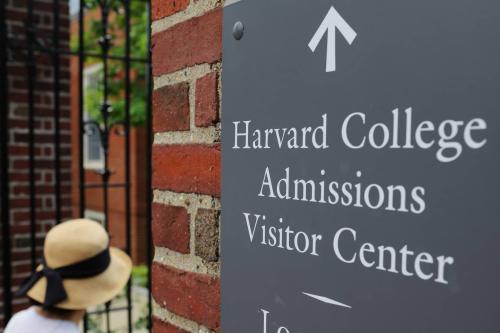A wake-up call from one of America’s top education watchdogs: Parents are ultimately responsible for their kids’ future success.
The American people want students to learn more. In poll after poll, the public names education as the most important issue facing the nation today. As you read this, President Bush and Congress are negotiating a final agreement on education legislation in a rare display of bipartisanship. At the same time, nearly every state is moving to reform schools. Good policies will help, but schools cannot do it alone. No amount of money or legislation can change the central tenet of learning: The family is the single most important influence.
But learning takes time. People are more likely to learn the things they spend time on than those they don’t. This common sense rule is known by anyone who has tried to master a difficult skill, from playing piano to swinging a golf club. It’s true for school subjects, too, as has been confirmed by a massive body of research. Still, children in the United States don’t devote much time to learning outside of the classroom. The average American high schooler spends five hours on homework per week—that’s the daily amount in most high-achieving nations and less than one-tenth of the approximately 60 hours per week spent outside of school, apart from sleeping and eating.
Families need to re-examine how their children spend their time—and re-evaluate their priorities. Here are five activities parents can focus on to ensure their children’s success at school:
The issue: Homework.
The problem: The popular misconception that kids have too much.
The fix: Accept homework. It is essential.
A recent book, “The End of Homework”, made a big splash by charging that excessive homework is destroying families. The book cites a University of Michigan study as saying grade schoolers spend 134 minutes a day on homework. That’s inaccurate. The researchers found that 3- to 12-year-olds study an average of 134 minutes per week, not per day. Reputable publications also have misreported the study’s findings, saying, for example, that the homework load has tripled since 1981 for students ages 6 to 8. Sounds like torture—until you look at the numbers. The “tripling” represents an increase of about 10 minutes, from 71/2 to 18 minutes per day. That’s still not much homework. And the average jumped because kids who previously didn’t study at all started devoting some time to homework. Research shows homework boosts achievement in grades 6-12. Harris Cooper, an expert on homework, recommends a sensible target for the average student: Ten minutes per day per grade level (e.g., 30 minutes for third-graders, 60 for sixth-graders, 90 for ninth-graders).
The issue: Socializing with friends.
The problem: School performance falls as time spent with friends increases.
The fix: Influence of adults must outweigh that of friends when it comes to school.
Lawrence Steinberg at Temple University has documented
how American teens spend their time. In their out-of-school
hours, they spend more time socializing than anything else—20 to 25 hours a week. As kids spend more time with friends,
academic performance drops. Why? First, socializing takes up
time that could be devoted to schoolwork. But there’s a
deeper reason: Studies of adolescents reveal that peer
groups may adopt a shared set of values that demean
academic learning. Nearly one-fifth of students say they don’t
try as hard as they could because they worry about what
their friends might think. Only one in three say their friends
believe good grades are important.
The answer is not to lock kids in their bedrooms. Rather,
schools and parents need to convey consistently high
expectations. Peer values are strong, but adult values are
stronger. Even teens realize that; a 1997 survey showed they
feel adults don’t demand enough of them. “The students seem
to be crying out for the adults in their lives to take a stand
and inspire them to do more,” says Deborah Wadsworth, the
president of Public Agenda, a non-partisan polling group that
focuses on educational issues.
The issue: Extracurricular activities.
The problem: Sports are all-important.
The fix: Cut back on sports if they interfere with schoolwork.
Team sports—especially baseball, football, basketball and soccer—exert a strong hold on our culture. In a Brookings Institution study to be released next month, foreign exchange students who attended U.S. high schools were asked whether success in sports is more important to American students or students back home. Two-thirds said sports are “much more” important to American students. The average high school student spends 10 to 15 hours per week on extracurricular activities, mainly sports, but also on band, orchestra, drama and other clubs.
Do sports affect student learning? In moderation, participation is healthy. For academically weak students, sports can make school more attractive and reinforce the importance of being a good student. Achievement falls off sharply, however, for students who devote more than 20 hours weekly to extracurricular activities. Varsity squads easily can spend that much time on practice, conditioning, travel and competition.
Kids who spend more than 20 hours per week on sports probably borrow time from other activities. Sacrificing study time means sacrificing the future. If students are failing classes, or are in danger of failing, a tough choice must be made. It should be based on what enhances a child’s future. Adult income, health, rates of alcoholism, teen parenthood and the probability of committing a crime all are statistically correlated with education. None of them is correlated with the ability to dribble a ball or complete a pass.
The issue: Television.
The problem: Television usually is not the problem; people just think it is.
The fix: Limit, don’t turn off, the TV.
Television often is blamed for depressing student achievement. Some of that is a bum rap. Students who are casual viewers—no more than an hour a day—tend to do better academically than students who watch no television at all. American children don’t stand out as the world’s most avid viewers. Even in high-achieving Japan, parents have trouble prying kids away from the TV. In the United States, children’s television viewing appears to have declined since 1981. So we can’t blame TV for our nation’s low ranking on international tests.
The key to preventing TV from negatively affecting achievement, like other activities in children’s non-school hours, lies in exercising moderation, not in halting the activity altogether. Why are occasional viewers better students? They probably are discriminating with their time, using TV to stay informed of current events or to enjoy cultural shows. But heavy viewing definitely takes a toll. Half of eighth-graders report watching three or more hours of TV daily. In both reading and math, those students perform at significantly lower levels than occasional viewers.
The issue: Part-time jobs.
The problem: Students work too much.
The fix: Curtail weekday jobs during the school year.
About two-thirds of U.S. high school students hold part-time jobs, working an average of 15 to 20 hours per week. One in six works 25 hours. That is unheard of in other industrialized nations; parents there would be ashamed, because it would suggest they tolerate children shirking their most important responsibility: getting a good education. In the most recent international study of student achievement, 55% of American high school seniors said they work three or more hours daily. In Sweden and Switzerland, two of the highest-achieving nations in mathematics, fewer than 10% work that much.
Some people argue that work teaches responsibility and how to function in the real world. A better way to learn responsibility is by taking the most difficult classes available and completing assignments promptly and efficiently. And really, who is better prepared for the real world: someone skilled in math and science or in flipping hamburgers and making change at a cash register?
As with sports, 20 hours of work per week seems to be the limit; studies indicate that working more impedes learning. Some kids work late at night, and although there are laws against it, enforcement is spotty. High school teachers will tell you students fall asleep in class. Unless absolutely necessary, high schoolers’ jobs should be limited to weekends and summer.
Friends, sports, jobs and television consume more than 90% of the average teen’s time outside of school. Reducing each activity by just two hours a week could increase study time from five to as much as 13 hours. An enormous amount of time would remain for recreation and fun.
Learning takes effort. It is not innate. The American people never have flinched from tackling tough tasks. The challenge today is to improve education. Schools can’t do it all. Neither can parents. Only when schools and parents work together to expect more from children will there be substantial progress. Schools need to stay the course of raising academic standards. Parents need to structure children’s out-of-school time so they can meet society’s rising expectations for learning.
Golden rules for parents
For the first time, the National PTA has published a valuable
new guide, “How to Help Your Child Succeed,” to aid parents
in helping children navigate the challenges of school. The
guide lists 10 critical keys to success and provides resources
or implementing them. Topics range from helping your child
manage homework to steering her or him away from drugs and
alcohol. Explains National PTA President Shirley Igo: “It deals
with those issues that parents deal with every day—talking
with your children, encouraging your children, being involved
in the school, supporting and helping your child at home with
their schoolwork. ” For information, visit pta.org.


Commentary
Op-edSchool Success Begins at Home
August 26, 2001